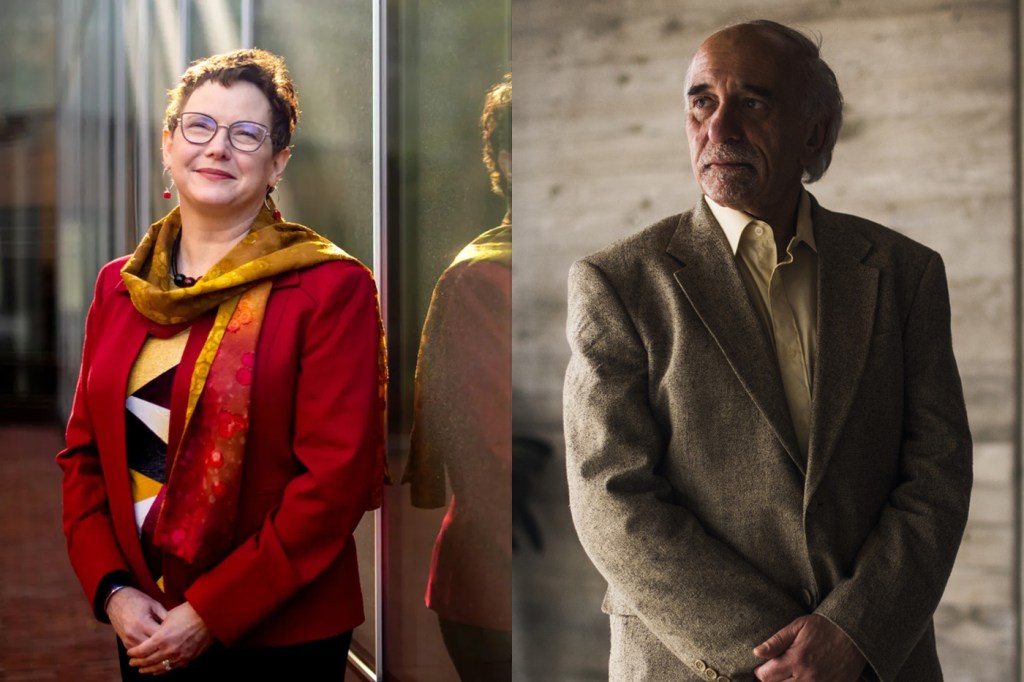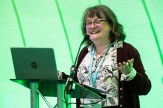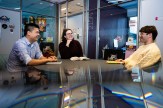Northeastern dean and distinguished professor join latest cohort of American Academy of Arts and Sciences
Northeastern dean Elizabeth Mynatt and distinguished professor Eduardo Sontag have been elected to the prestigious American Academy of Arts and Sciences for interdisciplinary careers focused on the human within science.

“I’m still pinching myself,” Elizabeth Mynatt says of learning she’s been elected a member of the American Academy of Arts and Sciences. “It’s just exhilarating.”
Mynatt, who is dean of the Khoury College of Computer Sciences, studies how humans and computers interact.
The “longest thread of my work has focused on human-centered AI for aging in place — so, how to support older adults,” she says. “To support their independence and quality of life. But by focusing on older adults, I have also worked in areas such as breast cancer and diabetes.”
Eduardo Sontag, university distinguished professor in bioengineering and electrical and computer engineering, and an affiliate member of the mathematics and chemical engineering departments, also joins the Academy, but for a career that has made breakthroughs in the mathematics of nonlinear and complex systems, with repercussions for biomedicine, systems biology and neural networks.
Sontag says that his work has focused on determining how to “model systems mathematically and how one can steer them in order to achieve desired purposes,” a field more broadly called control theory.
These systems — and the purposes they might be steered toward — are numerous, Sontag says. The unifying concept in his work “is this idea that you have systems in which things change in time. This could be an airplane, this could be a car — in the context of a self-driving [vehicle]. It could be a cell in your body.”
“My work,” he continues, “is on the theoretical foundations, the basic mathematical concepts.” In developing conceptual principles and algorithms, scientists and practitioners in “all these different fields can apply the ideas and the concepts.”
The American Academy of Arts and Sciences — often simply called “the Academy” — stands as one of the most prestigious organizations a scholar can be invited into. Founded in 1780 by the Massachusetts legislature, the Academy seeks “to cultivate every art and science which may tend to advance the interest, honor, dignity and happiness of a free, independent and virtuous people,” according to its original charter.
“They’ve played a leading role,” Sontag says, not just in science, “but also the arts.”
A truly interdisciplinary organization, the Academy “convenes leaders from every field of human endeavor” to address the issues facing the world and to tackle new ideas, states its mission statement.
While she is a computer scientist, Mynatt’s own work has been deeply interdisciplinary. In fact, she says that she feels like her “work has always been on the edges of computer science by including elements from psychology and from design, from social sciences.
“It’s an affirmation for that work to be recognized,” she continues.
Sontag’s career has also crossed disciplines. He earned his Ph.D. in mathematics, work that extended into quantitative biomedicine and biomathematics over the next 40 years. Sontag has appeared as an author on “over 500 research papers and monographs and book chapters” and serves on the editorial board of multiple journals within his fields, according to the Sontag Lab.
“I multitask a lot,” Sontag says, who is also an affiliated faculty member at Harvard Medical School’s Program in Therapeutic Science and a research affiliate at MIT’s Laboratory for Information and Decision Systems. One of the questions he’s working on now is, “How would you understand interactions between the immune system and tumors? The immune system has a role in regulating cancer, but sometimes it fails. So how do you understand that?
“How do you use, for example, therapies that don’t destroy the immune system?”
Featured Posts
Mynatt says, “I’m a member of the SIGCHI Academy,” the Special Interest Group on Computer-Human Interaction, “which means I’ve been recognized by my peers. I’m a fellow of ACM, which means I’ve been recognized by my field. And then to be part of the Academy of Arts and Sciences means to be recognized by the nation and alongside fellow scientists.”
ACM is the Association for Computing Machinery, one of the major societies within computer science.
“In a field as dynamic as computer science, it is incredibly important to have individuals that can step out of their day to day,” Mynatt continues, “and ask really challenging questions about the future of the field.”
What are those challenging questions? Mynatt says that it’s not only to make “computer science accessible, but [ensure] that its impact in the world is equitable.”
As the first computer scientist from Northeastern to become a member, Mynatt notes that she is also “thrilled to represent the growing number of women in STEM as a whole.”
“Our ultimate objective is to improve the world through scientific and engineering advances,” Sontag said during an acceptance speech for the 2022 Richard E. Bellman Control Heritage Award — presented by the American Automatic Control Council “for distinguished career contributions to the theory or application of automatic control.”
Sontag says that, “As a fellow of the three main societies in engineering and mathematics, the Institute of Electrical and Electronics Engineers, the American Mathematical Society and the Society for Industrial and Applied Mathematics, I strive to emphasize the importance of rigorous thinking in a professional environment,” but the honor of joining the Academy provides him with “a bigger voice in explaining to a broader public the role of fundamental mathematics in addressing problems that are really important to society. ”
“What am I looking forward to now that I’m a member?” Mynatt asks. “I hope this gives me [an] even greater opportunity to speak to the mission that we have at Northeastern.”
“I’m humbled by the experience,” Sontag concludes.
Mynatt and Sontag join four other Academy members currently at Northeastern: Lisa Feldman Barrett, Herbert Levine, Judith Tick and President Joseph E. Aoun.











